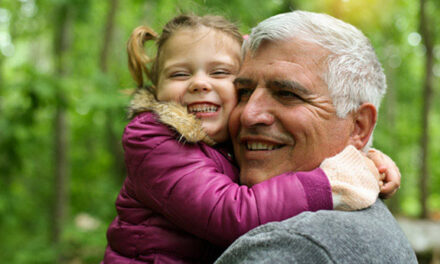There’s an interesting quote from Mark Twain:
Few things are harder to put up with
than the annoyance of a good example.
Clearly, he knew the power of positive living and the fact that good role models annoy some people. Why is that?
Probably because people with strong character are consistent about living out their convictions; it’s rare to see them stray from what they believe. And to others who are who are inconsistent in how they live, or maybe are still figuring out what they stand for, a consistent, positive example can be annoying. It can make some people feel pressure to get their act together.
This is part of being role models for our grandchildren, and there are really no downsides for us as long as we are genuine and our good character isn’t merely an act.
What are they seeing in us?
We know that parents are usually the most important and most prominent role models for children. But our grandkids still need other positive adult influences and examples, and we grandparents are ideal candidates for that role.
For many years, a big part of my message to parents—and especially to fathers—has been about being consistent, reliable role models for their children. Those insights still apply to us as grandparents, even if it may look different and we may have fewer opportunities.
That starts with an awareness that our grandkids are always watching us, and our words and actions are making an impression. Important values are often caught even more than they are taught. So, for good or not-so-good, the actions they see in us reveal our priorities and our character far more powerfully than our words do.
We also set a powerful example through our regular routines and behaviors: being on time, getting into good daily habits, showing up at their competitions and performances, keeping an orderly household, hosting other families for meals, volunteering at a local charity, living within a budget, having good books around that we’re regularly reading, and on and on. Of course, our negative habits make an impression as well.
Everything counts when it comes to influencing our grandkids.
And sometimes this is where the “annoyance” comes in. Sometimes our grandkids enter the teen and young adult years and experiment with things that we wouldn’t recommend. They might hang out with friends who live by values that seem opposite from ours. They might get involved in hobbies or other pursuits that we think could be harmful. They might get into serious trouble or completely abandon family connections.
If we can maintain a relationship with them, our example will still be a factor. They already know what we stand for, so we may not even need to say anything. But our consistent, positive example will still be there, and it might annoy them in a good way. It might help them reconsider some of their decisions.
And when they have made mistakes or strayed from the path we may have wanted for them, that’s when our unconditional love is even more powerful. We love and accept them anyway. They see that we’re still the same people, and our love for them hasn’t wavered. They can still count on us. They know that because of the example we’ve been setting all along.
What values and character traits have you tried to model for your grandkids? Share wisdom and connect with other grandparents on our Facebook page here.
This was adapted from Ken Canfield’s book, The Heart of Grandparenting.





